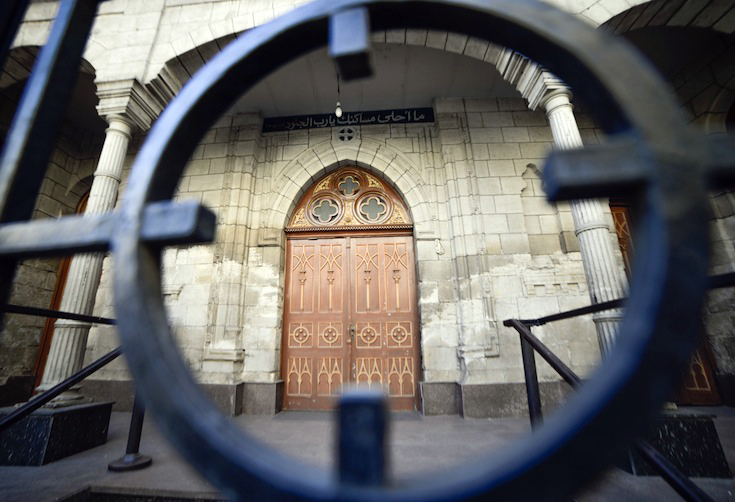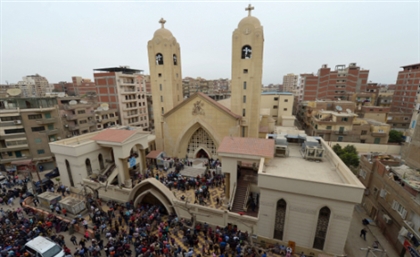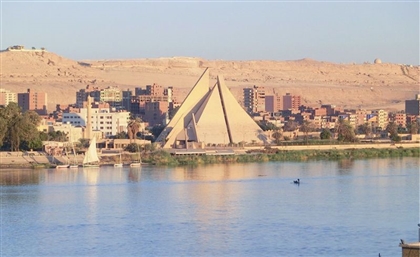'Betmooto': A Christian Girl Reflects on Faith, Justice, and the Death of a Community in Egypt
[Op-Ed]: Following the heinous Palm Sunday attacks, Monica Gerges reflects on faith in a time of uncertainty and forced narratives of unity when reality is anything but.

Standing in the metro, I looked out at my own reflection in the window – a t-shirt, a backpack, big curly hair, and a cross around my neck that hangs almost in defiance. I glanced around the car and met eyes with a woman whose wrist bears a cross tattoo; we exchanged sombre smiles of acknowledgement. As though an out of body experience, I looked around at the sea of fabric-wrapped hair and met eyes with a few women but, for some reason, I sensed that all they saw about me in that moment was that cross around my neck. Do they feel sorry for me? Do they hate me? Do they not know what to say to me? Are they happy? Are they ashamed? I can't tell. But one thing I do know: I've become very aware of the statement of faith I'm wearing, and it seems like it's all anyone sees in me today.
As Christians commemorated Jesus’ entry into Jerusalem along a path lined with welcoming palm branches, this Palm Sunday, it was Him who welcomed some of them home as they shouted ‘Hosanna’ – meaning save/deliver/have mercy. Just a few months ago, in December, a bomb in St. Peter and St. Paul Coptic Orthodox Church in Cairo claimed 30 lives, then 7 Christians were killed in North Sinai’s El Arish in February and hundreds displaced to Ismailia under death threats, and just this past Sunday two explosions – one in St. George Coptic Orthodox Church in Tanta and the other at Alexandria’s St. Mark’s Cathedral – took the lives of at least 44 people.
But once the suffocating heartache begins to subside and you're left with an unshakable heaviness in your heart where joy ought to be, you begin to process. It makes you ask questions. It makes you look to the Muslims in your life – the ones who've become like family, who you wouldn't trade for the world – and wonder if there's someone, somewhere, in one of their families, who would love to see you become a bygone statistic.
One supposedly 'isolated incident' after another – cemented by threats from the Islamic State’s Egyptian affiliate against their ‘favourite prey’, Egypt’s Christians – asserts the narrative that Egypt's Christians are the country’s present untermensch; ‘less than’ humans, undeserving of life. And while many will propagate for 'unity' and play Egypt's endless history of nationalistic anthems, it would appear they've missed decades' worth of facts that point to a deep-seated hatred that no song of unity by Egypt's A-list celebrities can uproot.
It was immediately after processing the news on Palm Sunday that I had the 'I don't want to go to church for Easter' thought. For the very first time, somewhere in the pit of my stomach, I was afraid. And I still am. And while fear is not the essence of my faith, and while I know I have a God who's far bigger and far more powerful than fear and death themselves, there remains a truth that Egypt’s Christians are dying, and I am one of Egypt’s Christians.
Earlier today, an old man in a galabeya and 3emma looked at the cross around my neck and muttered “betmooto” – “you (pl.) are dying” – as he continued to quietly walk away. He didn’t threaten me. He didn’t taunt me. He baffled me. He made an observation to which many in the country are choosing to turn a blind eye while hiding behind those who genuinely fight and take action against people who threaten death on the account of religion in Egypt. This reality exists, and people can't continue to skirt it under the proverbial rug of unity anthems and rounds of sympathy by those propagating the idea that Egyptians are 2eed wa7da (one hand) while doing nothing to address the core problems making this 'Utopian’ state of unity and coexistence seemingly unattainable. The reality is, betmooto.
This reality makes it hard not to be resentful and it makes it hard to love, and that’s a problem. I – as a Christian – am called to do two main things: love God, and love people. To love the people it's hardest to love, not just the ones who love me; to love regardless of the other person; to love relentlessly. And while it's already difficult to love without condition to the extent of my human capacity, things like this make it difficult to see beyond the circumstances and to love certain people. It makes me angry at people like the shop owner by my apartment who keeps telling me he sells the things I usually buy from the Christian shop owner on the other side of the building, so I should buy from him instead of 'min barra' (from 'outsiders'). It eats away at something in you. It makes you angry.
“Christians aren’t given the platform to be outraged,” a non-Christian friend argued. “You can be sad but you can’t be angry. You’re expected to be tolerant and accepting of Muslim sympathy. When is enough enough?”
Raising questions I hadn’t processed myself, he questioned: “When do Christians stop being the targets of the state’s constructed chaos? If the tables were turned and it was an attack on a mosque, would it get the same response? Would we be having the same conversation?”
So the cross I hung around my neck this morning became my symbol of defiance in that neither bombs nor death will make me hide that I belong to the nation of the cross. It was my rebellious stance, a challenge against anyone who believes that death will silence people. But staring at my reflection as the metro whizzed from one stop to the next, increasingly aware of how this cross has become my identifier – the lens through which people see everything I say, do, and think – it began to challenge me, instead. Am I fit to represent what it means to be someone who bears a cross? When people look at me as an embodiment of the Christian faith, as a representative of this ‘Jesus’ guy, am I doing it justice?
I understand the need to demand justice and truth and solutions. I understand the need to fight for life, and the frustration of trying to make people believe that Christian lives are just as valuable as everyone else's. I understand the need to shout at the top of our lungs because it’s just so unfair that we still need to have these conversations where we explain to the un-oppressed that saying “we’re all 2eed wa7da” when something like this happens doesn’t actually make us any less oppressed. Yet, at the risk of sounding like a happy-clappy Bible thumper, I remain deeply convinced that it’s in moments such as these that it matters more than ever for me to continue to love in spite of oppression. Isn’t Christianity about forgiveness, turning the other cheek, and ‘what would Jesus do’?
“We can talk about love, tolerance, and acceptance, but it’s not real. Not when you think about how different it would be if this was an attack on a Muslim holiday,” my non-Christian friend continued. “So fuck tolerance! I want justice. I want change. I want a reaction that’s not ‘whoops’ or ‘sorry’. I want even a smidge of accountability. I want a monument signifying every attack on a church since the beginning of time so that when people say it’s isolated or it doesn’t happen, I can point at it and say ‘you were saying…?’.”
While I’ve personally never been one to raise proverbial fists and demand justice and change, I’m conflicted. I’m torn. I want to be angry and I want to forgive. I want to shake every single person by the shoulders and yell at them that my faith doesn’t make me undeserving of life, and I want to live a life of grace like Jesus did because that’s the core of who I am as a follower of Christ, and it’s a huge responsibility. I want to extend mercy and I want to open people’s eyes to the reasons why this is happening; I want people to be aware of why Egypt is mourning and why people are dying. I want the truth to speak louder than the lies. I want love and I want justice.
Can’t I have both?
Actually, I am called to do both.
Love and justice are not mutually exclusive. Instead, it is what God requires of us: “To act justly and to love mercy and to walk humbly with [our] God.”
To love does not mean to stay silent; it doesn't mean to allow for injustice without fighting to expose the root of this messy, bloody, and intrinsically rooted problem. To forgive doesn’t mean to ignore; it doesn't mean to consider this just another church bombing and accept this as the status quo. To turn the other cheek doesn’t mean to welcome hurt; it doesn’t mean helplessness, nor does it mean death in the face of mercy and grace.
Love is not passive; love is not silent.
Love is a force to be reckoned with, and we will continue to seek justice and truth while we love and forgive. That is the calling of the cross I humbly bear.
*The views expressed in this op-ed are the author's and don't necessarily reflect CairoScene's.
























